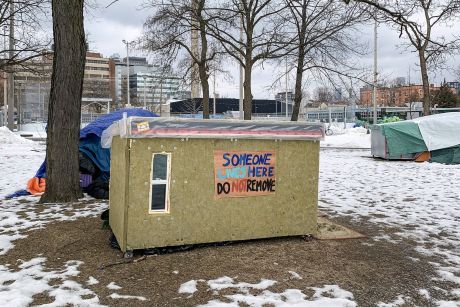News
You are here
COVID and homelessness: Toronto leaves the most vulnerable out in the cold

February 26, 2021
In the midst of a deadly outbreak of COVID-19 in Toronto’s homeless shelters, the City is moving ahead with a lawsuit against a local carpenter who has been making tiny shelter homes to keep the homeless safe and warm through the winter.
Toronto shelters hold an average of nearly 7,000 people per night in winter. Latest data shows 135 active COVID cases in 10 different locations, most of them the more transmissible new variants.
“The only way out of this is vaccination. We have to vaccinate this group as soon as possible,” health justice campaigner and doctor Naheed Dosani told the Globe and Mail.
But the odds of prioritizing those living on the street are not good. “We’re homeless, we’re trash,” said shelter user Brian Cleary. “How do you think the homeless are going to come out of this?”
Toronto is in the early stages of a humanitarian crisis. If society can be judged by how it treats its most vulnerable, we have to share Cleary’s worry.
To underscore its failure to deal with poverty and homelessness, even in the midst of a pandemic, the City of Toronto is going ahead with its lawsuit against Khaleel Seivwright, a local carpenter who is building tiny wood shelters for the homeless and paying for them out of his own pocket.
Jennifer Jewell spent 3 months living in one of Seivwright’s shelters in Dufferin Grove Park. She said the shelter was warm and dry and came equipped with carbon monoxide and fire alarms. Jewell is immuno-compromised and even her doctor agreed she was better off in the park than in one of the City’s shelters.
Speaking to CBC radio, Jewell said, “I can only speak from experience, but I was in Dufferin Grove Park, and I was really surprised by the love and support and the kindness of the residents there. They were delivering us food. They donated blankets. You know, they donated tents. Like, we had the most amazing support there. And, you know, the park was large enough that we could be in our own little space and not interfere with anyone else's enjoyment of the park.”
So far the City has refused to drop its application for an injunction to declare Seivwright’s tiny homes illegal. In a statement issued through his lawyer Seivwright declared: “The money the City is spending to attack me could be put into safe housing for those that need it.”
Update:
On February 25 City of Toronto workers began removing tiny shelters from City parks. Bureaucrats claim the shelters were abandoned. Anti-povertty activists and homeless people camping in the parks insist they were in use.
Section:
Topics:










